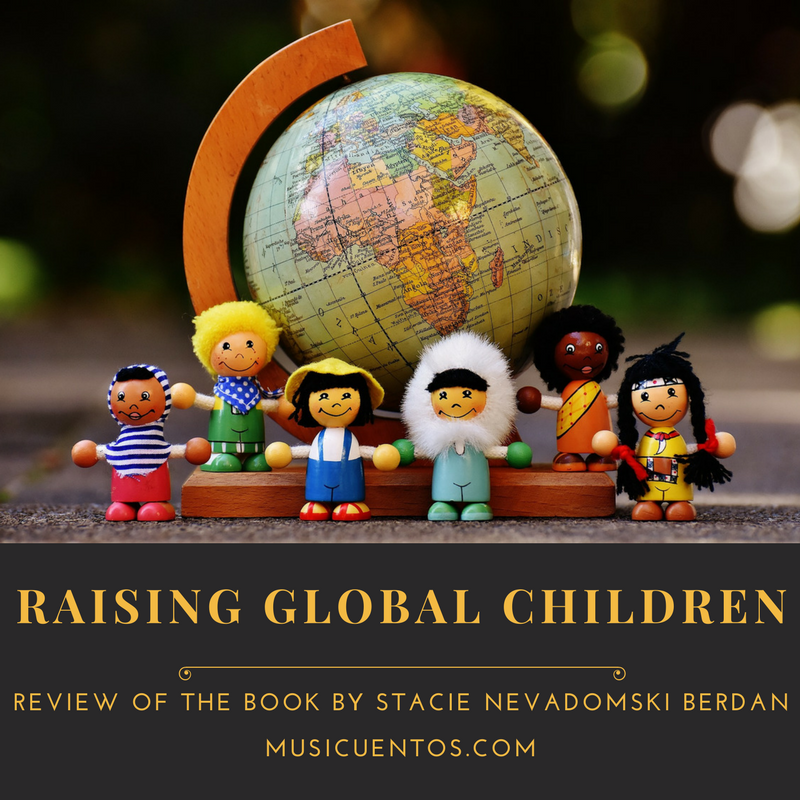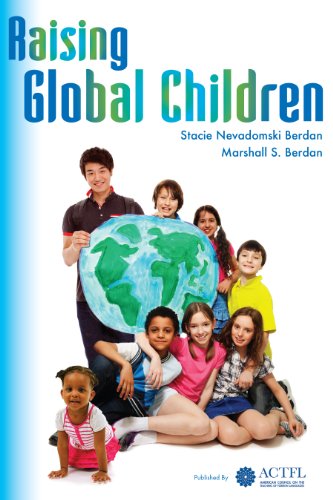In the month of December I’ve normally taken somewhat of a break from blogging.
But wait, Sra. Musicuentos, all of 2017 has been “somewhat of a break” from blogging.
I know. And my personal life is appreciating it very much.
In any case, in what remains of this December I still hope to post a few pseudo-typical end-of-year offerings, including a couple of brief book reviews, my annual “All the Fluff” Musicuentos Book Club post, and a list of a few of my popular posts this year in a post that’s really all about gratitude.
Because I know you…
 In this post, please don’t think, “Come on now, Sara-Elizabeth, you started the year resolving to be more positive, don’t let us down with another one of those critical book review posts.” But don’t take this post that way. My review of Raising Global Children is not about the book itself so much as it is that I know my audience. Being published by ACTFL, the book lured me with a promise to offer something new in the global mindset. And mostly, it did not.
In this post, please don’t think, “Come on now, Sara-Elizabeth, you started the year resolving to be more positive, don’t let us down with another one of those critical book review posts.” But don’t take this post that way. My review of Raising Global Children is not about the book itself so much as it is that I know my audience. Being published by ACTFL, the book lured me with a promise to offer something new in the global mindset. And mostly, it did not.
The author, Stacie Nevadomski Berdan, has been strongly advocating for world language learning in the United States for some time. I first learned about her when she was the keynote speaker for our 2014 state language teacher organization, KWLA. I’m not entirely sure what her relationship with ACTFL is, but I know they published the book, and I know her advocacy resonates a message reminiscent of someone on staff at the organization or a Teacher of the Year. There’s one big difference though: from all appearances, Stacie isn’t bilingual.
Ok, so anyone who has followed me on Twitter during ACTFL keynotes over the past several years knows I have an issue with people who pay lipservice to the great work language teachers are doing but don’t speak any other languages themselves (and don’t seem to be learning). Stacie does live in the world language education bastion of Glastonbury, Connecticut, and seems to have pushed language skills for her children their whole lives, and seems connected with every quality language learning option in the U.S. (and more).
But back to the book…
In Raising Global Children, Berdan moves from digging into what our global society is looking like, to exploring what a global mindset in children is, to particular categories of global education: language, culture (food, music, books, and friends), and travel. She ends with some content specifically about helping teenagers expand their global mindset and then offers advice on how to advocate for raising global children, with another solid dose of advocating for increased access to quality language programs for students.
I can summarize my reaction to the book in a couple of ways. First, this book was my 2017 “I have to finish this because I said I would” book. Not because it was especially boring or unreadable, but it is particularly those things for language teachers. (I confess. In my schedule, it took me 2 years to read this.) Like I said, this post is more about knowing my audience than evaluating Berdan’s message.
And so, knowing my audience, I’ll advise you that Berdan is a businesswoman who built this book on some research and also a lot of surveys she sent to parents across the globe. That she seems to have communicated a lot with ACTFL on what proficiency is, quoting them directly that it demonstrates
what a language user is able to do regardless of where, when or how the language was acquired.
And that she sometimes fundamentally misunderstands some things about language learning.
RE: choosing which language to learn
Some languages are grammar-heavy; others require memorization of word-order rules.
RE: learning mode options
What’s the best way to learn a second language? Traditional classroom learning is always preferable if it’s available.
Many adults have acquired various levels of ability using commercial learning programs such as Rosetta Stone, Berlitz, and Pimsleur.
Immersion study… can help make the leap from novice to intermediate, or intermediate to fluent…
RE: communicative competence in children
Make sure they use dictionaries to learn key words correctly.
RE: college programs
Unless your teens are attending a dual immersion school or you speak another language regularly at home, it probably won’t be possible for them to become completely fluent in a second language by graduation. At best they will “only” be proficient.
College administrators across the country bemoan the fact that they can’t make proficiency in a second language a graduation requirement because the vast majority of students come with little or no language ability and, therefore, are unable to develop proficiency in 4 years.
On the other hand, you’ll see a lot that keeps you nodding, like starting global experiences at your dinner table, exposing children to real local culture while traveling, following world news as a family, and incorporating diversity into your teaching materials. My point is that if I know you, you’re already doing these things.
I do want to share some links, many I’d never heard of, from Berdan’s extensive and helpful sets of resources:
- Volunteer Match
- People to People
- Rustic Pathways high school travel & service
- Global Connections from the Peace Corps (formerly “Correspondence Match”)
- iEARN Collaboration Centre
- Students of the World
- Institute for International Education
- Teachers for Global Classrooms
In conclusion…
One respondent of Berdan’s surveys really resonated with me as she described the “gymnastics” routine she goes through to make sure her children are exposed to opportunities for language and culture. I say with her that the routine is worth it, and
We choose to execute the handstands that give our children a global perspective.
What I’m betting, though, is that you, dear Musicuentos reader, are well aware of what those handstands are, and thus you’d be better served directing your time to something else, like getting some situation-specific help on Bilingual Monkeys or figuring out how to pay for that trip abroad or language camp. If not, or if you’re looking for a gift for someone you wish knew this stuff, or if you’re looking for a few more connections with organizations that help foster language learning and study abroad, give Berdan’s book a look.
Has Musicuentos made a difference in your teaching? Consider becoming part of the Thanks Crew on Patreon.




